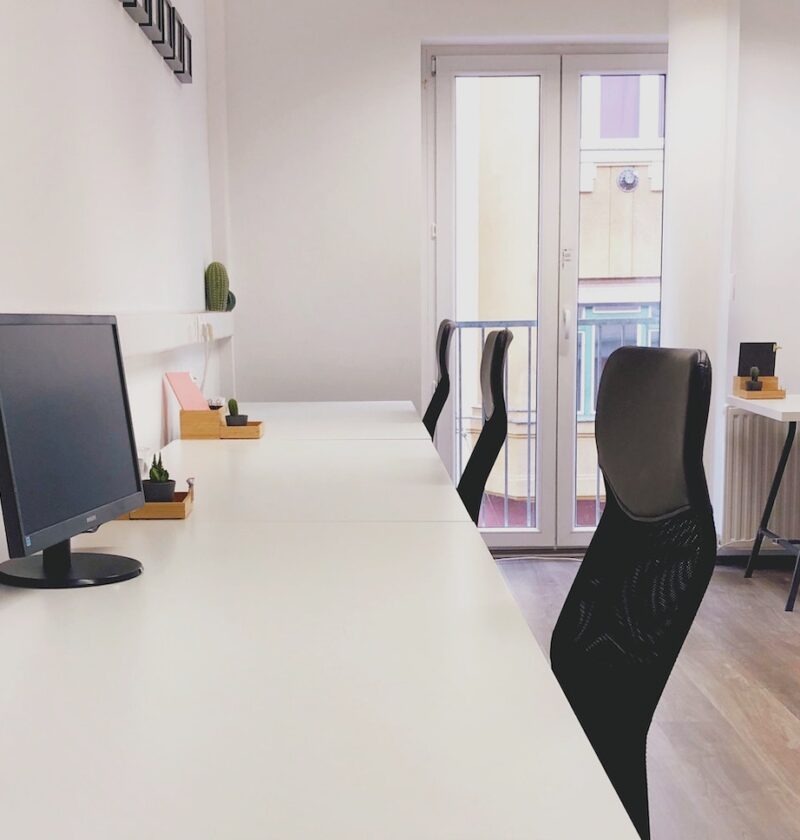Nowadays, we can find coworking spaces in big cities worldwide. In the last two years, the coworking industry has done pretty successfully. It is multiplying as it responds to new working trends such as flexible work hours and various location alternatives for employees. The future of coworking spaces is bright and hopeful in 2022, with work becoming hybrid and organizations welcoming this transformation.
Whether you’re a freelancer, a remote worker, or a startup team, everyone wants the flexibility that coworking spaces provide. As a result, every need and occasion has a coworking space. People’s demands and desires for a workspace will differ, much like when they book a stay at a hotel or Airbnb.
Many companies and people will be interested in services and amenities such as internet access and speed, meeting rooms, parking spots, membership fees, or even access to gyms and bars.
The challenge, of course, is determining which type of coworking space meets your interests and goals. So, what are the many categories of coworking spaces on the market? Here we will examine some basic types of coworking office space to understand better what’s available.
Conventional Coworking Spaces
Conventional coworking spaces are typically small and do not exceed two levels with desks or offices to rent flexibly daily, weekly, or monthly. These workspaces attract freelancers, remote workers, consultants, and small businesses.
The constant presence of all members in the same place facilitates its operation; this closeness, fostered by networking events, brings communities and teams together and encourages interactions. The primary draw of this sort of location is its culture and philosophy of community, collaboration, learning, and sustainability. As a result, there has been an increase in companies opting for coworking spaces lately.
Specialized Coworking Spaces
The most significant benefit of industry-specific workspaces is that people and businesses will instantly be a part of a network of people who share the same interest, which may result in productive partnerships. In addition, most specialized coworking spaces provide mentoring and training programs. For example, niche-specific coworking spaces can be facilities for artists, studios for dancers, child playgrounds for parents, and commercial kitchens for chefs.
A coworking space that targets a specific market can bring together industry-specific innovators. Specialized coworking spaces have a fantastic opportunity to customize their services and make them valuable for a particular segment of users.
They are all interested in creating an optimal workplace environment for specific industries, which may appear unusual compared to conventional coworking spaces. Therefore, one of the current coworking space trends and industry development is the growth of niche-specific coworking spaces.
High-End Coworking Spaces
Luxury coworking spaces distinguish themselves from common spaces with high-end design, all-inclusive memberships, private rooms, and sumptuous decor. These kinds of coworking spaces are in the central downtown areas of big cities. They give their residents experiences similar to those found in five-star hotels.
These spaces may offer memberships that include discount dining benefits in the city, access to VIP events, gyms, bars, and other lifestyle conveniences. The community in these places is divided by floor or membership type. Businesses that are client-facing or need to uphold a certain degree of status at work, such as substantial international corporations, are drawn to the growth of these highly prized facilities.
Wellness Coworking Spaces
This coworking space is for those who wish to work in a healthy and productive atmosphere. These areas have everything a professional need to be productive, such as excellent lighting, fresh air, and comfy chairs.
Conference rooms, communal areas, kitchens, and printers are all available in wellness coworking spaces. They also frequently feature on-site yoga classes, massage therapists, and meditation rooms where people may unwind and clear their thoughts.
Coworking Spaces for Digital Nomads
With the popularity of remote work and the digital nomad lifestyle growing, nomadic coworking spaces are becoming more common. Entrepreneurs can discover inspiration and the ideal mix between work and recreation in rural coworking spaces and coworking spaces in the countryside. Desk space with no membership required is what these coworking spaces offer.
They usually charge per hour or day. Nomadic coworking spaces will offer basics like Wi-Fi, coffee, and occasionally dining options. Coffee shops are obvious examples of coworking spaces digital nomads can use to get a stable Wi-Fi connection and good power supply while sipping a skinny latte. However, today’s nomadic coworking spaces are in different locations, such as restaurants, libraries, and hotels.
Coworking Hotels
These hotels include coworking spaces as part of their amenities—making them an excellent option for business travelers who need to get work done while traveling. A coworking hotel provides a quiet and private workspace and all the other benefits of being in a hotel.
Individuals benefit significantly from this combination since they may take advantage of hotel amenities, including a gym, pool, restaurant, and membership benefits.
Virtual Offices
A virtual coworking space is a workspace that exists only in cyberspace. Virtual is an efficient and cost-effective solution for businesses and individuals that want to access the conveniences of a professional environment without a physical office.
Amenities offered by virtual offices are a physical address, reception, call answering, and more. Virtual offices benefit entrepreneurs working from a home office, remote employees, people who travel often, and digital nomads.
Coliving Spaces
People share space and amenities in this unique coworking and living arrangement form. As a result, they provide a less expensive, more convenient, and friendly alternative to standard apartment living.
Residents in coliving spaces get a private bedroom or suite and access to community rooms such as kitchens, lounges, and work areas. Furthermore, some coliving spaces include amenities such as gyms or event rooms. These places are ideal for people who work while traveling. They can live and work in a city without dealing with the inconvenience of finding an apartment/desk/office.
Condominium Coworking Communities
Coliving and coworking are an excellent match. Property rentals, hotels, and coworking are all hospitality-related companies, so it’s not strange that the owner of an apartment building turns their business center into a coworking space. Creating a coworking space in a condo or apartment complex is an intelligent business concept.
Condominium coworking is a collaborative workspace in which users can rent an individual office or studio space to share with other professionals from all sectors. This might be an excellent choice for those who require a private workspace but don’t want to pay for a complete office. It’s also a perfect opportunity to meet new people and network with other professionals.
Coworking Incubators
Incubators’ coworking spaces offer resources, mentoring, and ideas to help entrepreneurs flourish. They exist to assist a startup in expanding and can be found at colleges and universities, giving users access to specialized equipment and research opportunities.
Traditional incubators are available for startups for a short time. However, coworking spaces often don’t set deadlines and allow others, like freelancers, to use the area. Their open-ended membership design allows a stronger emphasis on community building. Companies and people must still apply for membership and will only be admitted if they share the organizational culture.
Minimal Coworking Spaces
These coworking spaces with minimal amenities are great for freelancers who want a desk and Wi-Fi to be productive. The affordability of these spaces is a huge factor. You should expect fewer amenity perks, while the majority will still offer Wi-Fi and coffee, but possibly no more conference rooms for meetings or private office space available. This alternative is inexpensive, quiet, and meets minimal needs.
Coworkers who wish to save money on office expenses run minimalist coworking spaces. The manager significantly impacts the ambiance and community of minimal coworking spaces. Typically, the people who work in such small areas are friendly and connected. Events often consist of get-togethers and meetings organized by the most active individuals for their fellow employees.







